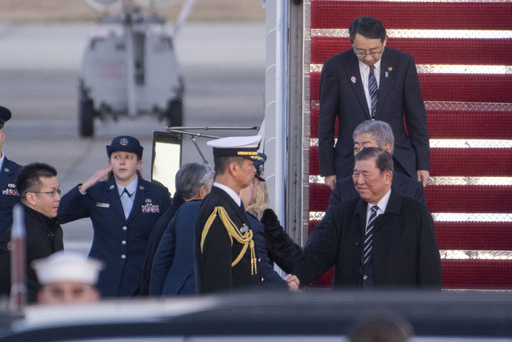
In preparation for his inaugural meeting with President Donald Trump, Japanese Prime Minister Shigeru Ishiba has been actively engaging with key figures in the tech industry. This week, he held discussions with SoftBank CEO Masayoshi Son and OpenAI CEO Sam Altman, both of whom had a recent audience with Trump in the White House. Ishiba also reached out to his predecessor, Fumio Kishida, and the widow of Shinzo Abe, Trump’s former friend and Japanese Prime Minister, who was known for his close connection with the American leader through golfing and personal interactions.
“As this will be our first direct talks, I aim to establish a relationship of trust,” Ishiba expressed to the media prior to his trip to Washington, which is set for Friday. Recreating the positive rapport that Trump had with Abe, who stepped down from office in 2020 and was later assassinated, will be challenging for Ishiba. Nonetheless, he prioritizes connecting with Trump, eager to foster a strong alliance.
This visit marks Ishiba’s first official trip since he took office in October and he is notable as the second global leader to meet with Trump during this new term, following Israeli Prime Minister Benjamin Netanyahu’s recent visit. Ishiba arrived in Washington on Thursday evening for a brief stay, anticipating about two hours of discussions with Trump, which will include a working lunch and a joint news conference before his return to Tokyo.
The urgency of Ishiba’s journey stems from the need to solidify U.S.-Japan relations under Trump’s administration, especially with the prevailing geopolitical tensions posed by China’s assertiveness in the Pacific and the threats posed by North Korea’s nuclear capabilities. In their discussions, Trump plans to address various matters, including joint military training, Japanese investments within the U.S., enhancing cybersecurity, and expanding collaboration in space and innovative technologies such as artificial intelligence and semiconductors, according to administration officials.
On Ishiba’s part, he aims to remind Trump about the longstanding alliance between the nations, particularly considering Trump’s track record of imposing tariffs that affect both allies and rivals to boost U.S. manufacturing. It’s noteworthy that Japanese companies provide employment for nearly one million Americans and have maintained the status of leading foreign direct investors in the U.S. in recent years, although a substantial trade deficit of over $68 billion was reported between the two countries in 2024. A senior official from the Trump administration highlighted that the trade deficit is viewed as a critical indicator of the economic fairness in their bilateral ties.
Another delicate topic for Ishiba will likely be the proposed acquisition of U.S. Steel by Japan’s Nippon Steel, valued at $14.1 billion. This deal faces obstacles having been blocked by President Biden last month over national security concerns, while Trump previously voiced strong opposition to foreign investments in U.S. firms such as this. Despite not planning to initiate discussion on this issue, Ishiba is prepared to advocate for Nippon if Trump brings it up, according to an anonymous Japanese government source.
In response to the growing concerns around defense, Japan is set to increase its defense spending significantly, aiming for 2% of its GDP by 2027, measuring an overall 60% increase within five years. This aligns with NATO standards, despite Japan itself not being a NATO member, although it collaborates closely with the alliance. Meanwhile, Trump continues to urge NATO allies to escalate their defense contributions, suggesting a formidable target of 5%, which may be challenging for many countries to achieve.
To allay any potential worries from Trump, Ishiba could highlight Japan’s strong support of U.S. defense initiatives, noting its investments in military equipment like fighter jets and missile defense systems. During a recent interview, Ishiba noted, “President Trump is a good listener, so there is potential for good chemistry between us.”
In preparation for his discussions with Trump, Ishiba convened with Son and Altman, pointing out Japan’s desire to enhance cooperation in artificial intelligence to foster global peace and safety. This visit is seen as a crucial opportunity for Ishiba to restore the significant diplomatic ties previously established between Japan and the Trump administration, as highlighted by Tennessee Senator Bill Hagerty, who served as Trump’s ambassador to Japan during his first presidential term.
The rapport that Abe created with Trump during his first term was distinctive, marked by shared experiences like rounds of golf and dinners in Palm Beach. Even in the face of initial tensions over trade policies and defense spending, the two leaders forged a deep relationship. Hagerty suggested that Ishiba might benefit from reviving his golfing skills in hopes of rekindling a similar connection with Trump, encouraging, “He should take up golf lessons again. Golf diplomacy can be an excellent avenue for communication.”

